#this is not an open discussion
Explore tagged Tumblr posts
Text
The difference between the singlet side of mogai and anti endo system coiners is crazy
It's pretty much a given that I've seen in the mogai community now that terms are free to be used by whoever, even if u don't like or agree w them
U can't stop ppl from identifying w a term
Yet I keep seeing anti-endo system term coiners straight up saying endos can't even use the term
Yeah obviously respect ppls dni's, but if the role they coined applies to us I'm gonna use it???
It's baffling
3 notes
·
View notes
Text

Remembering that one embarrassing thing you did 50 years ago.
#He's not open to discussing it rn#He's trying his best give him a minute#my art#art#shadow the hedgehog#shadow#sth#sonic fanart#sonic the hedgehog#digital art
9K notes
·
View notes
Text
also in regards to that last article about varied ways of thinking about psychosis/altered states that don't just align with medical model or carceral psychiatry---I always love sharing about Bethel House and their practices of peer support for schizophrenia that are founded on something called tojisha kenkyu, but I don't see it mentioned as often as things like HVN and Soteria House.

ID: [A colorful digital drawing of a group of people having a meeting inside a house while it snows outside.]
"What really set the stage for tōjisha-kenkyū were two social movements started by those with disabilities. In the 1950s, a new disability movement was burgeoning in Japan, but it wasn’t until the 1970s that those with physical disabilities, such as cerebral palsy, began to advocate for themselves more actively as tōjisha. For those in this movement, their disability is visible. They know where their discomfort comes from, why they are discriminated against, and in what ways they need society to change. Their movement had a clear sense of purpose: make society accommodate the needs of people with disabilities. Around the same time, during the 1970s, a second movement was started by those with mental health issues, such as addiction (particularly alcohol misuse) and schizophrenia. Their disabilities are not always visible. People in this second movement may not have always known they had a disability and, even after they identify their problems, they may remain uncertain about the nature of their disability. Unlike those with physical and visible disabilities, this second group of tōjisha were not always sure how to advocate for themselves as members of society. They didn’t know what they wanted and needed from society. This knowing required new kinds of self-knowledge.
As the story goes, tōjisha-kenkyū emerged in the Japanese fishing town of Urakawa in southern Hokkaido in the early 2000s. It began in the 1980s when locals who had been diagnosed with psychiatric disorders created a peer-support group in a run-down church, which was renamed ‘Bethel House’. The establishment of Bethel House (or just Bethel) was also aided by the maverick psychiatrist Toshiaki Kawamura and an innovative social worker named Ikuyoshi Mukaiyachi. From the start, Bethel embodied the experimental spirit that followed the ‘antipsychiatry’ movement in Japan, which proposed ideas for how psychiatry might be done differently, without relying only on diagnostic manuals and experts. But finding new methods was incredibly difficult and, in the early days of Bethel, both staff and members often struggled with a recurring problem: how is it possible to get beyond traditional psychiatric treatments when someone is still being tormented by their disabling symptoms? Tōjisha-kenkyū was born directly out of a desperate search for answers.
In the early 2000s, one of Bethel’s members with schizophrenia was struggling to understand who he was and why he acted the way he did. This struggle had become urgent after he had set his own home on fire in a fit of anger. In the aftermath, he was overwhelmed and desperate. At his wits’ end about how to help, Mukaiyachi asked him if perhaps he wanted to kenkyū (to ‘study’ or ‘research’) himself so he could understand his problems and find a better way to cope with his illness. Apparently, the term ‘kenkyū’ had an immediate appeal, and others at Bethel began to adopt it, too – especially those with serious mental health problems who were constantly urged to think about (and apologise) for who they were and how they behaved. Instead of being passive ‘patients’ who felt they needed to keep their heads down and be ashamed for acting differently, they could now become active ‘researchers’ of their own ailments. Tōjisha-kenkyū allowed these people to deny labels such as ‘victim’, ‘patient’ or ‘minority’, and to reclaim their agency.
Tōjisha-kenkyū is based on a simple idea. Humans have long shared their troubles so that others can empathise and offer wisdom about how to solve problems. Yet the experience of mental illness is often accompanied by an absence of collective sharing and problem-solving. Mental health issues are treated like shameful secrets that must be hidden, remain unspoken, and dealt with in private. This creates confused and lonely people, who can only be ‘saved’ by the top-down knowledge of expert psychiatrists. Tōjisha-kenkyū simply encourages people to ‘study’ their own problems, and to investigate patterns and solutions in the writing and testimonies of fellow tōjisha.
Self-reflection is at the heart of this practice. Tōjisha-kenkyū incorporates various forms of reflection developed in clinical methods, such as social skills training and cognitive behavioural therapy, but the reflections of a tōjisha don’t begin and end at the individual. Instead, self-reflection is always shared, becoming a form of knowledge that can be communally reflected upon and improved. At Bethel House, members found it liberating that they could define themselves as ‘producers’ of a new form of knowledge, just like the doctors and scientists who diagnosed and studied them in hospital wards. The experiential knowledge of Bethel members now forms the basis of an open and shared public domain of collective knowledge about mental health, one distributed through books, newspaper articles, documentaries and social media.
Tōjisha-kenkyū quickly caught on, making Bethel House a site of pilgrimage for those seeking alternatives to traditional psychiatry. Eventually, a café was opened, public lectures and events were held, and even merchandise (including T-shirts depicting members’ hallucinations) was sold to help support the project. Bethel won further fame when their ‘Hallucination and Delusion Grand Prix’ was aired on national television in Japan. At these events, people in Urakawa are invited to listen and laugh alongside Bethel members who share stories of their hallucinations and delusions. Afterwards, the audience votes to decide who should win first prize for the most hilarious or moving account. One previous winner told a story about a failed journey into the mountains to ride a UFO and ‘save the world’ (it failed because other Bethel members convinced him he needed a licence to ride a UFO, which he didn’t have). Another winner told a story about living in a public restroom at a train station for four days to respect the orders of an auditory hallucination. Tōjisha-kenkyū received further interest, in and outside Japan, when the American anthropologist Karen Nakamura wrote A Disability of the Soul: An Ethnography of Schizophrenia and Mental Illness in Contemporary Japan (2013), a detailed and moving account of life at Bethel House. "
-Japan's Radical Alternative to Psychiatric Diagnosis by Satsuki Ayaya and Junko Kitanaka
#personal#psych abolition#mad liberation#psychosis#altered states#antipsych#antipsychiatry#mad pride#peer support#schizophrenia#i have a pdf of the book somewhere if anyone wants#the book and the documentary also discuss some of the pratical struggles in creating a community like this which i also found helpful as#someone who is very interested in helping open a peer respite.
2K notes
·
View notes
Text
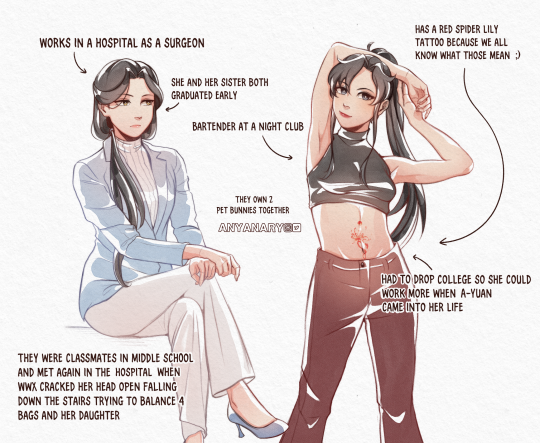
I present to you: fem wangxian
#I discussed this au with a few friends#it got out of control#now there's a whole side au for lan xichen and meng yao#and the Yi city gang#the untamed#the untamed fanart#mdzs#mdzs fanart#mo dao zu shi#the grandmaster of demonic cultivation#grandmaster of demonic cultivation#wangxian#wangxian fanart#gender bend#wei ying#wei wuxian#lan wangji#lan zhan#mxtx#mxtx fanart#danmei#commissions open#commissions welcome
1K notes
·
View notes
Text
what i feel like is lacking from conversations about plurality is how genuinely, fundamentally cool it is to be plural. doesnt it fascinate you how our brains can create entirely new selves, inner worlds, inner structures to keep itself afloat? doesnt it make you so curious? especially with regards to atypical plural experiences. i dont hate people for having entire systems full of fragments or fictives or subsystems. in fact, i find it wonderful, a miracle of the mind. you have a complicated inner world with unique lore? incredible, how did that develop? your entire system is full of fictives from the same source? thats amazing, hows that going? your system has entire layers on itself, with several systems running in tandem? wow, thats fascinating, how did you know? you believe you came from different worlds? tell me about them. please, tell me more about yourselves. id love to hear it. i do not fear the potential of the human brain.
#💙 cass#💿 red#<- typing#pluralgang#endo safe#endogenic#traumagenic#median system#multiple system#plural discussion#being a complicated plural doesnt scare me i find it beautiful#oh and btw before you say something stupid: yes this extends to people with hallucinations and delusions as well.#we extend this to all mental experiences. the mind is fascinating#approaching mental experiences with intrigue instead of disgust would open so many avenues for us as a species#but noooo yall are too busy upholding capitalist ideals. barf
2K notes
·
View notes
Text

Just gonna have to wait and see, right? Just wait and see! Just gotta wait and see! Who knows, we'll just have to wait and see! It's anybody's guess, we'll just have to wait and see! The future is exciting, we just gotta wait and see!
#personal#my art#Fuck your fake ass 'i am very smart!' intellectualizing “observations” and open your god damn ears.#do something for fucks sake. it's sickening seeing videos of ai crap and seeing rows and rows of repliers using their one brain synapse#to type “wow! very exciting!” “haha this is kind of scary! but in a really interesting way!”#and then they go about their day without a second thought while creative industries burn around them#i go to one of america's top tech schools too and it's enough to make you wanna tear our your hair#every day it's seminars and talks about “the potential consequences of ai!” when the consequences are happening NOW#NO MORE DISCUSSING NO MORE INTELLECTUALIZING NO MORE SOCRATIC SEMINARS NO MORE DEBATING. ACT YOU COWARDS#people are getting hurt RIGHT NOW. stop pretending to care when you clearly don't! just be honest and say you wanna make money#my time here has really made me hate academic spaces. you people are so god damn useless and cowardly.
3K notes
·
View notes
Text
I had a very short corkboard moment here where I talked about how I think that Lucanis is the companion in Veilguard who has merged with a spirit

And after seeing this tweet that Mary liked I think a lot of folks are inclined to believe that it's a spirit of pride
I don't think that's 100% right. If you read the wigmaker job and (if you haven't please direct yourself to my pinned to post where there's a Google drive folder with just a picture of my cat in it and no pdfs relating to BioWare) Lucanis Isn't prideful, far from it. Besides, pride seems to manifests with something to do with eyes and yes that can be seen in his tarot card and his armor, but when the spirit manifests on him it's in the form of wings. And I don't think that's the Pride he feels towards the crows manifesting, since it's been stated he sees it as a 9 to 5 and an obligation



In the wigmaker job he talks about justice for the slaves that've been mutilated and once they get their vengeance he states as much. So my first thought was that it was another variation of Justice/Vengeance uncorrupted like they were in Awakening. But when Justice manifests through Anders they're blue though maybe that changes depending on the host. I don't think BioWare would bring them back though considering how tied Justice is to Anders.
Wynn had Faith and Cole was Compassion, Solas is Pride and I'm thinking about how BioWare said that regret is going to be one of the central themes in Veilguard and that led me to think about how the opposite of Regret is Hope and how often in our imagery of it is associated with flight and therefore wings. It's also one of the few spirits listed below that we haven't seen in game yet

The last thing I want to mention was this little bit at the end of wigmaker where a magister is talking about Lucanis

This could very much well be just her saying that she's going to use him to kill other Venatori so she can use their corpses as a shield or maybe she did something to him. I think Lucanis is far too cleaver to get caught though and besides, he grew out a beard, they shouldn't recognize him
#dragon age#dragon age veilguard#dragon age the veilguard#lucanis dellamorte#This is an open discussion if anyone wants it to be please chime in
1K notes
·
View notes
Text
xinganhao 🌟 shared a moment with you: "have you ever tried this one?" 🔞
the one where ot13 answers what's your favorite juno position? mdni; suggestive themes. dedicated to @wonustars, who has matched my freak. #daserv 🙂↕️










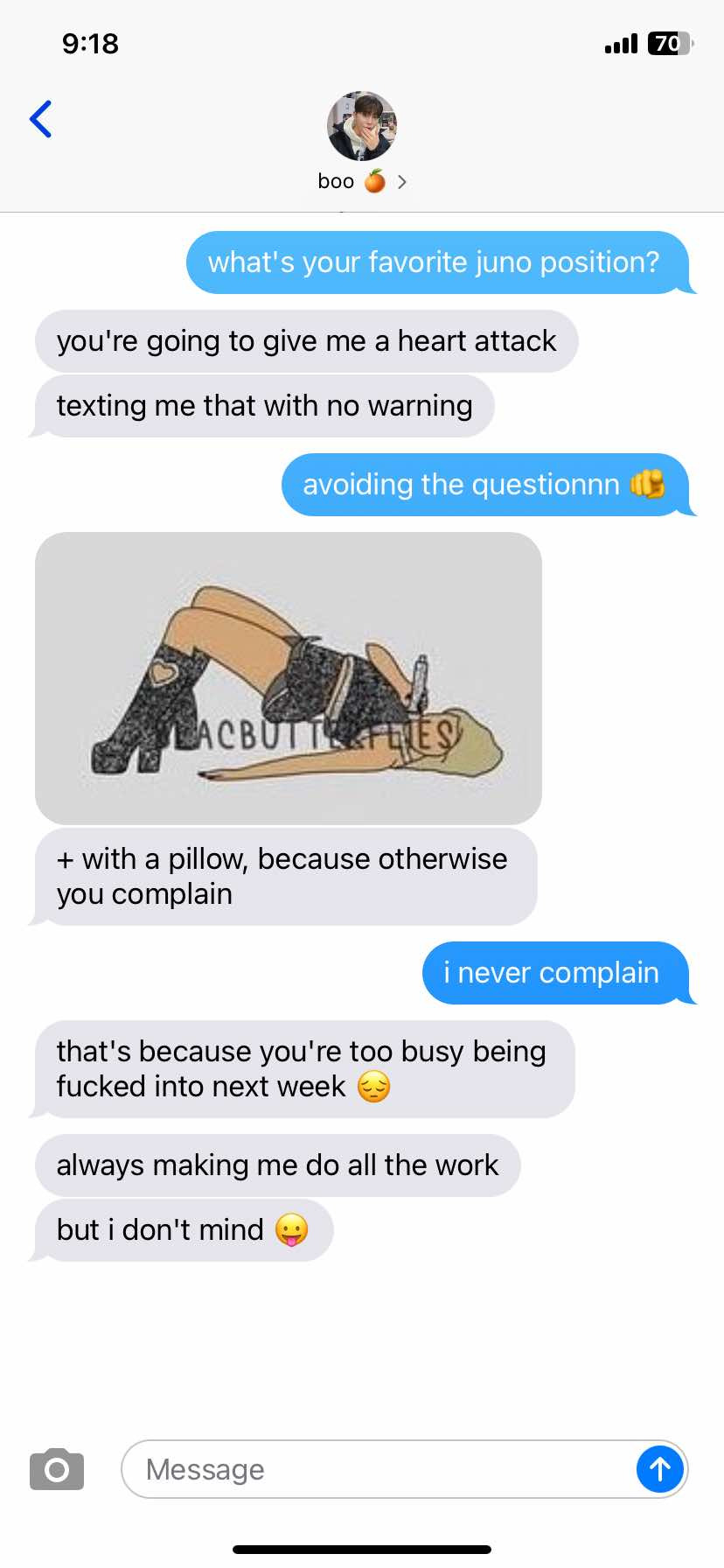


#svt smut#seventeen smut#svt imagines#seventeen imagines#svt smau#seventeen smau#── ᵎᵎ ✦ mine#[ filo au brainrot is so strong. i'm seeing visions ]#[ everybody say Thank You Anna for pulling user xinganhao out of the trenches ]#[ in the words of chan? they are just guys :) ]#[ this is an Open Discussion . feel free to share Thoughts . ]
737 notes
·
View notes
Text
i will take a caitvi reconciliation arc IF it’s caitlyn snotting and sniveling at vi’s feet. like. vi deserves to be chased and pampered and treated like a princess after the shit she just put up with bro 😭
#CAN SOMEBODY PLEASS BE NICE TO HER. LIKE IM BEGGING AT THIS POINT#caitlyn we are NOT on speaking terms#i don’t want this to open the discussion of people thinking i’m bashing her YES understand why she’s doing what she’s doing yes#it’s still fucked up things to do????#idk vi get behind me for now#arcane#arcane season 2#caitvi#caitlyn kiramman#violet arcane#vi arcane#jinx arcane
589 notes
·
View notes
Text
Does anybody else hate that sometimes therianthropy is treated like a cute aesthetic rather than an animalistic identity?
I get species euphoria by ripping objects apart, chasing animals, eating without utensils, walking on my toes, feeling how sharp my canine teeth are, among other things. None of these things are dainty or aesthetic, and to the average person it's probably not acceptable/normal behavior.
I feel like therians should (in a reasonable manner, we're still humans/humanoids guys) show this side more. Being animalistic in some way is part of being a therian and it shouldn't be shameful
Note: Im not 100 percent active in the alterhuman community so if I've gotten anything wrong since the last time I was here forgive me
- Lee , host , he/xey
794 notes
·
View notes
Text
The whole "breasts shouldn't be politicized because the primary purpose of breasts is to feed babies!" can be a fine jumping-off point, but I really wish people thought deeper than that when we talk about the ways in which bodies are politicized and restricted.
Like, why's it that when we talk about breasts, they must have some Higher Purpose? It's true that breasts aren't inherently sexual, but they aren't valuable solely because they can potentially feed a baby. A human body doesn't have to serve a Higher Purpose in order for it to not be legislated against or policed, and I just wish people would remember it isn't always about babies, about other people, about anything else other than the people who have that body.
#feminism#dysphoria tw#your body doesn't need to have an Intrinsic Worthwhile Purpose so that you can live without fear#and it is fine if people say this to criticize the way breasts are overly sexualized and fetishized or what have you...#...but i encourage people to not see this as an end-all-be-all argument#because this opens discussions about how we politicize bodies and how we interpret them#i see overlap between this and the way trans bodies are politicized and policed honestly#and i guess personally i'm just so tired of the idea that to be safe your body Must Have A Good Reason To Be#and i fear this may reinforce the idea that we Must Serve Purposes and Be Useful and Used#ask to tag (genuine)#and what would this say for childless people? or people who cannot bear children? if they have breasts are they 'useless bodies'#because i have seen the ways some people's bodies are treated when they do not 'work PROPERLY' and that scares me#it scares me to potentially start treating people with different bodies as Defective and Unworthy and Unproductive#and i don't always trust when people latch onto purpose-driven arguments for human bodies that it stops at that y'know#have seen some discussion amd whatnot so 👍#is it now time to clock put and be a silly goose yet?
5K notes
·
View notes
Text
dead boy detectives characters as art objects and sculptures
edwin payne

author: glen martin taylor charles rowland

author: robert hudson
crystal palace

author: glen martin taylor
niko sasaki

author: justin cloud monty finch

author: anders krisár esther finch
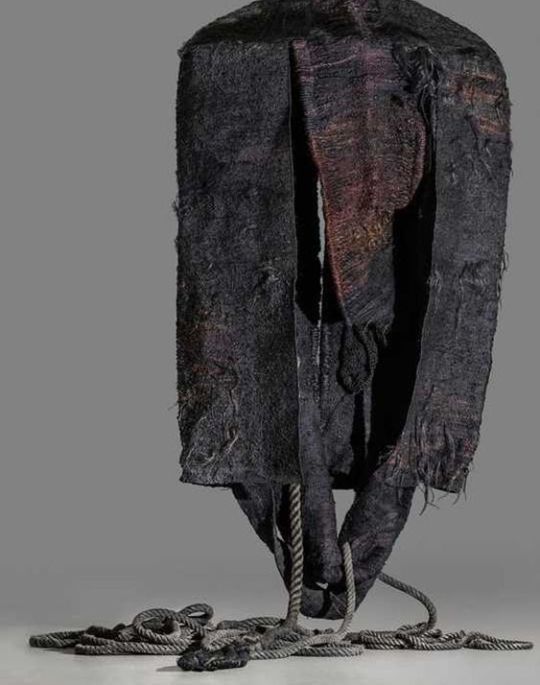
author: magdalena abakanowicz the cat king

author: toshihiko bito jenny the butcher

author: emmanuelle dupont the night nurse

author: elizabeth turk
[extended version with notes]
#dead boy detectives#dbda#highly subjective but. open to discussion#edwin payne#charles rowland#crystal palace#niko sasaki#the cat king#monty finch#monty the crow#the night nurse#jenny green#jenny the butcher#dbda edit#moodboard#art objects#objects#sculpture#marcela watches dbda#art#this is me trying to get into the core of them by the way. the very essence if you will#not specifically and not only their trauma
418 notes
·
View notes
Text
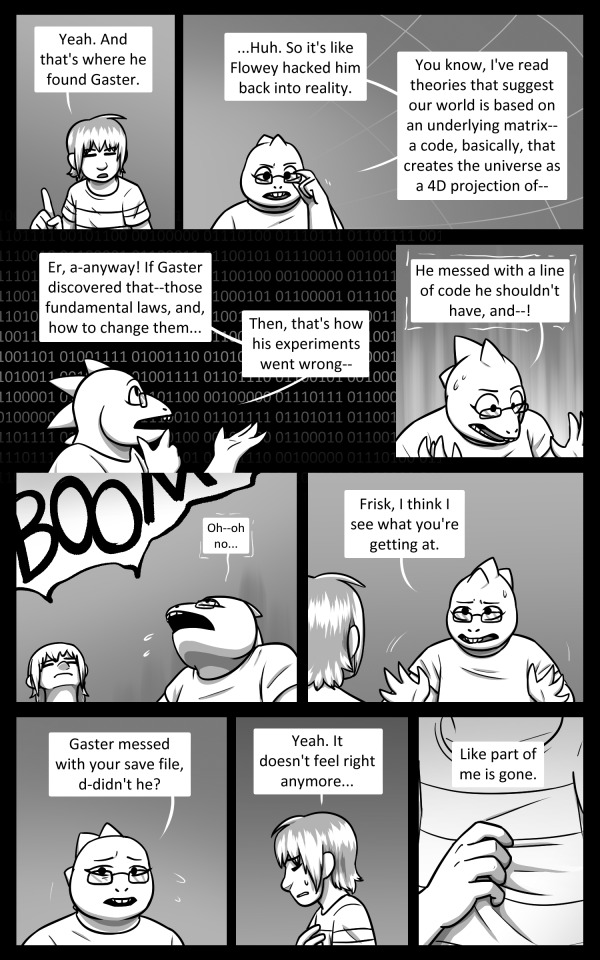
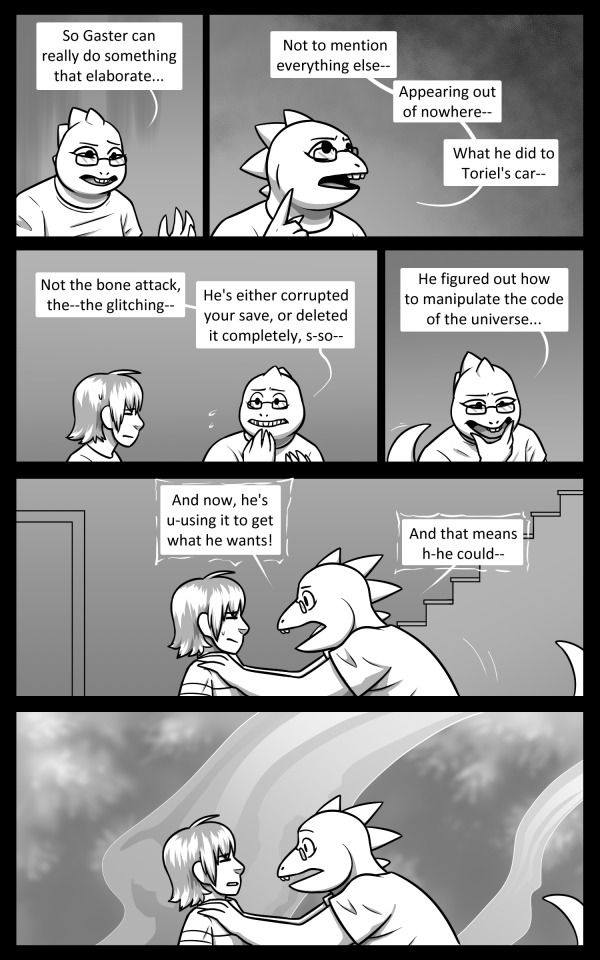
Unexpected Guests Chapter 10, Act Two: Page 6
First / Previous / Next
Out of sight doesn't mean out of mind.... Gaster won't let anything interfere with his goal.
Look for the next update on Nov. 16th!
#undertale#undertale comic#unexpected guests comic#frisk (undertale)#alphys (undertale)#it was nice to draw alphys nerding out -u-#that's a real theory she's discussing but it's basically one guy who advocates for it--typically not a good sign for validity in science >>#but it's great for worlds based on meta video games :>#i couldn't find an easy way to use undertale's source code so that's... just the opening narration in binary =u=;;;#so. no secrets there >>;
2K notes
·
View notes
Text
I CAN'T FIND THE POST TALKING ABOUT HOBIE DEFYING GRAVITY FOR THE LIFE OF MEEEEEE
edit: FOUND IT! thanks @cocksmashermcflufflepuff :3
*sighs* but still, come with me in this teory;
We are aware that in some scenes from ATSV we can see Hobie defying gravity because we can see Gwen's hair going up because AHEM gravity is a thing!
See examples:
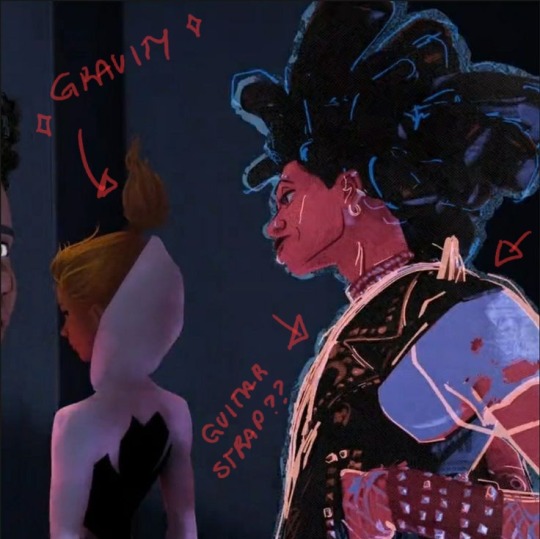
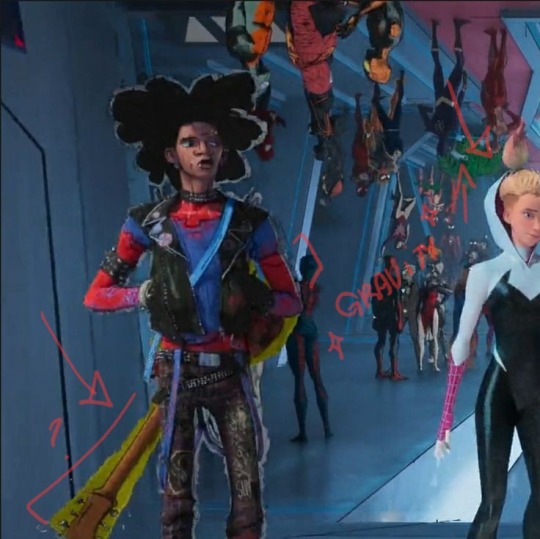
Adding this one becase APPARENTLY he can chose when gravity works on him??? (See the straps of his... suspenders?)
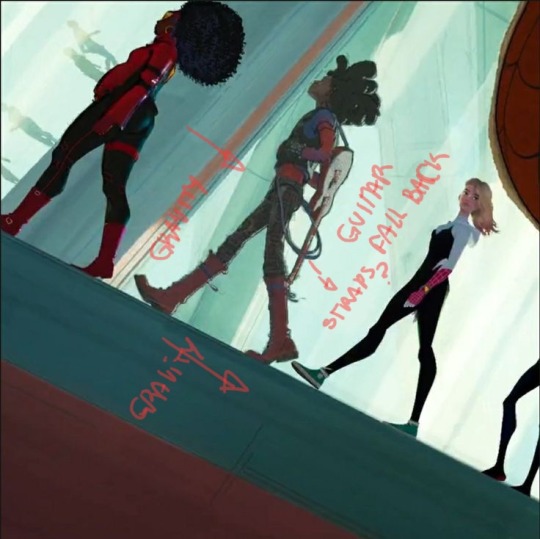
Please ignore my writing...
BUT I HAVE A GUESS!
Hobie has cutouts, right? Doesn't that make him FUCKING 2D?
We know his word is heavily inspired by a bunch of things from the 70s to the 80s, and wanna know something? The first time someone used 3d graphics on a movie WAS ON 1950!
So my theory is that Hobie's word is completely 2d (we can see a bunch of it on his intro) and that's why he can defy gravity ✨ but obviously he isn't 2d for the others because he's HUMAN after all so maybe when he changes portals? Ion know. This can obviously be debunked if we get a peek to his world on the next movie BUT UNTIL THAT I'm gonna be a firmly believer that he's 2D and that's why he doesn't follow the rules of gravity.
#bleak posting#hobie brown#spider punk#across the spiderverse#atsv#hobie spiderverse#hobie thoughts#yapping#theory#character analysis#haha me again with the hobie yapping#open to discussion#HELP ME FIND THE OG POST PLEASE#SO I CAN TAG IT#THANK YOU#spiderverse#into the spider verse#hobie across the spiderverse#atsv hobie#hobie atsv
560 notes
·
View notes
Text
I want to elaborate even further on why I think Alastor’s breakdown in the finale was (at least in part) motivated by the fact that he has come to care about the people at the hotel. A few people have responded to me saying they don't believe he actually cares or asking me about my opinions on certain counterarguments against the interpretation that he cares and I figured it would be easier to just make one post in response. (this is just meant to expand on my thoughts. You don't have to agree. That's half the fun of media interpretation.)
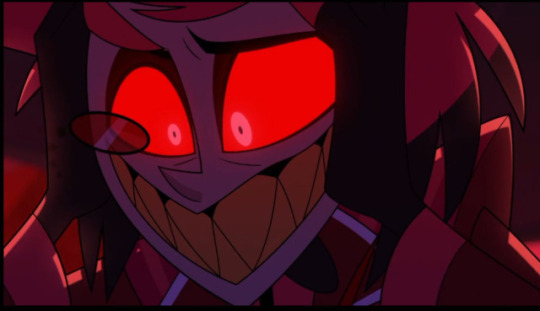
The consistent throughline I keep being told is that his breakdown was purely motivated by pride and loss of control and I do think these were massive parts of the breakdown.
Alastor is very aware of the fact that the situation around him is spiraling out of his control. That the notoriety he had cultivated as an unchallengeable overlord is crumbling. His time away allowed the fear he sowed to dull. He keeps coming face to face with beings that rival or surpass his strength. People who wouldn’t dare question him before are banging on his door. His foothold in the world isn’t secure like it once was and that has him reeling.
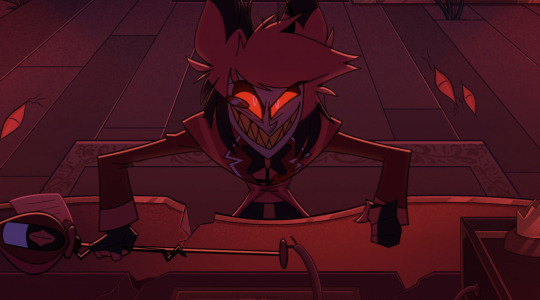
Alastor's pride is a driving factor in his actions, but, like I said in my last analysis, I think this is only part of it. I think this breakdown is motivated by the fact that he feels like he’s losing control of himself on top of the situation around him.
I'm going to start with the points/questions I've been asked first then expand on my thoughts after.
The first one I was asked about is the interpretation that Alastor was mocking the very idea that he would sacrifice himself for someone else when he says "Great Alastor, altruist, died for his friends." and I think that would work if it wasn't for the visuals paired with this line.
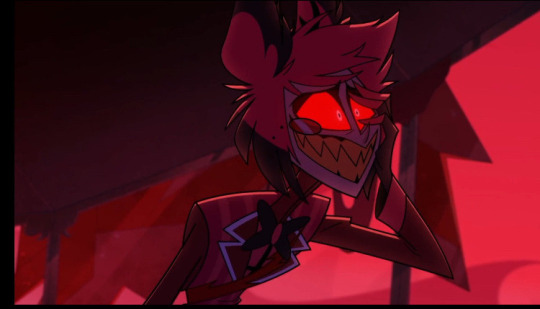
He literally looks like THIS when he is speaking the line. This isn’t the face of someone mocking the very idea that he would do this.
It was actually this shot that convinced me there was some truth to the words he was saying because it looks like he’s beginning to have a breakdown over the fact that this is almost exactly what happened.
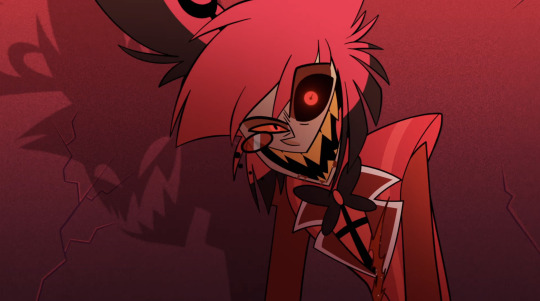
The second one that I was asked about was the idea that he was forced to fight and protect Charlie by whoever owns his soul. But if he was forced to fight in this battle due to his contract why not describe it this way when alone? How could he even leave if he was forced to fight and protect the hotel? I doubt there was a caveat that he could leave the fight if he was seriously injured if he was ordered to fight and protect Charlie and the hotel.
I do think he's at the hotel because of whoever owns his soul, but I don't think it's why he fought or why he helped Charlie get Cannibal Town to aid them through his connection to Rosie.
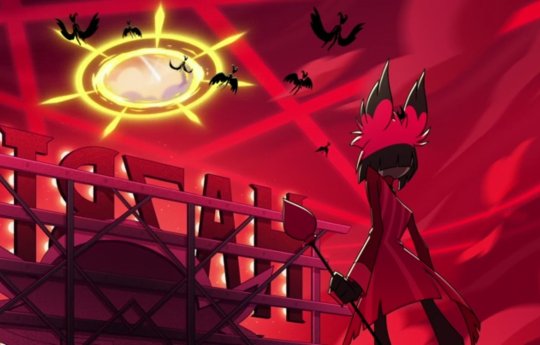
And the last one that I was asked about was the idea that the demons had to be fighting for love like Carmilla said to Vaggie to defeat the angels and the reason Alastor didn't win was because he was fighting purely for his own interests. Freedom, power, and control.
And, while I think the base idea of this is really interesting (This is a genuinely cool idea!) and could challenge Alastor's more selfish motivations, the show itself doesn't really back this up.
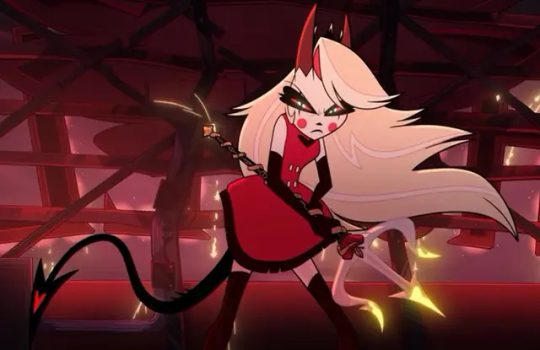
Charlie is the literal embodiment of fighting to protect those she cares about-- she has the biggest heart out of anyone at the hotel-- and yet she doesn't defeat anyone in this battle.
Before she faces Adam all she uses is a shield to protect herself and the other residents. She apologizes to those she hits, while Vaggie finishes them off. When she does face Adam she doesn't beat him. She gets in a good hit, but she isn't able to finish him off. She would have been killed if Lucifer didn't step in.
Plus, Alastor's shield killed multiple exorcists before Adam destroyed it, so I don't think this means he hasn't grown to care about the residents of the hotel or that there wasn't some part of him that was fighting to protect them.
Now to expand on my own thoughts now that I've answered the questions I've gotten, it's not just the final battle/fallout that brought me to believe he had come to care about the hotel and its residents.
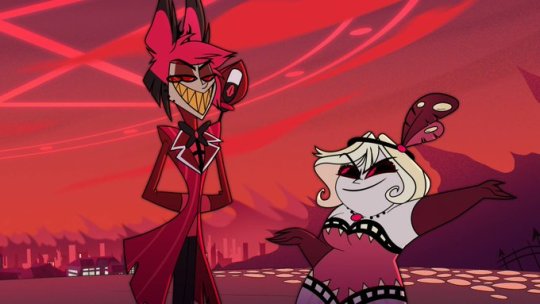
The show itself seems to want us to think he is starting to grow “accustomed” (In Alastor’s words to Niffty) to the group with little moments that are played straight like when he sends Mimzy (possibly his oldest friend) away, telling her she can stay if she truly wants to try for redemption, but if she just wants to put the hotel in danger then she has to leave.
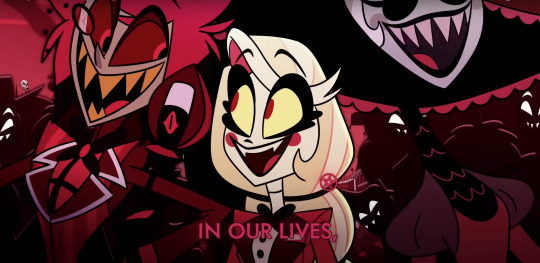
When he says he believes in Charlie and wants to mentor her in cannibal town. He even gives her his microphone which is a literal extension of himself to help her.
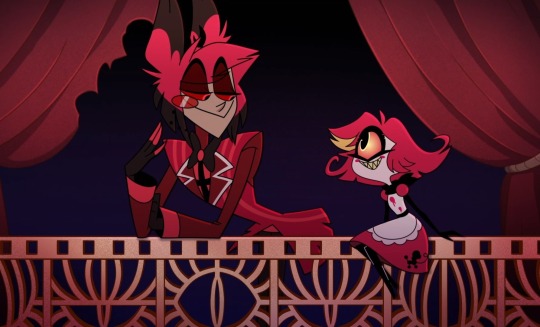
When he talks to Niffty (who he is clearly fond of) and admits he finds the group enjoyable to be around. He says he could grow accustomed to them after Niffty says she really likes them almost in agreement with her.
There is no sinister undertone or hint of the usual facade Alastor puts on in these scenes.
Like I said above I don't think that the fact that Alastor has come to care about the residents is the only factor in his breakdown or the only reason he fought in the first place (Alastor's blatant overconfidence in his fight against Adam makes it clear pride was a factor. That overconfidence is why he lost that battle). It's a combination of multiple things (his pride, loss of control, desire for freedom, etc), but I do think it's a valid reading that it was a part of it considering all the information the show has given us.
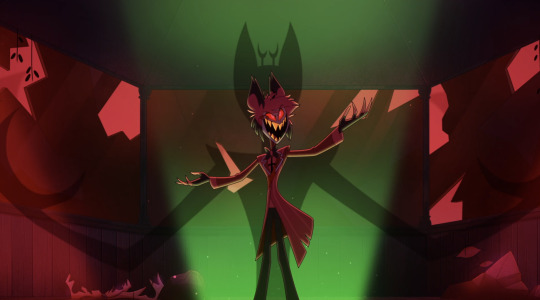
This isn't to say I think Alastor is going to melt and be a team player for the hotel from now on. In fact, I think he's going to lash out against this internal change.
Alastor has always put himself first and in the finale he almost died trying to protect this hotel and it's rattled him. It's challenged his entire self-perception. He doesn’t like that it’s being challenged. That he’s losing control of himself on top of the situation around him. So, he doubles down on his initial goals.
I think this internal conflict is fascinating. I wouldn't have written so much about it if I didn't. I genuinely can't wait to see what they do with it in season 2.
If you feel differently feel free to send an ask, message, or respond to this post. I'd love to hear what other people think! Differing views and connections to characters is what makes media so impactful and fun to consume.
#hazbin hotel#hazbin hotel alastor#alastor#radio demon#alastor hazbin hotel#hazbin hotel spoilers#i really loved this show#I think Alastor is such a fascinating character#this is just a response#I hope this opens a discussion#I like hearing how other people interpreted things#this is just my view of things
825 notes
·
View notes